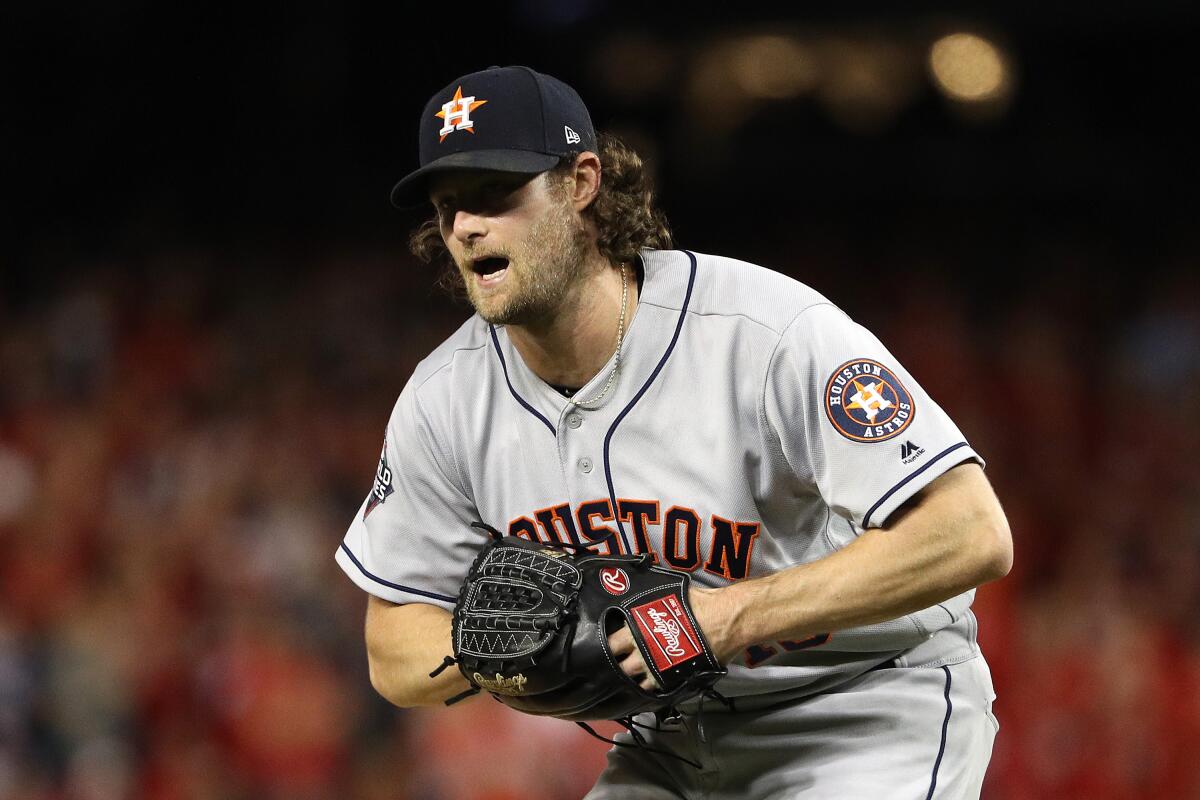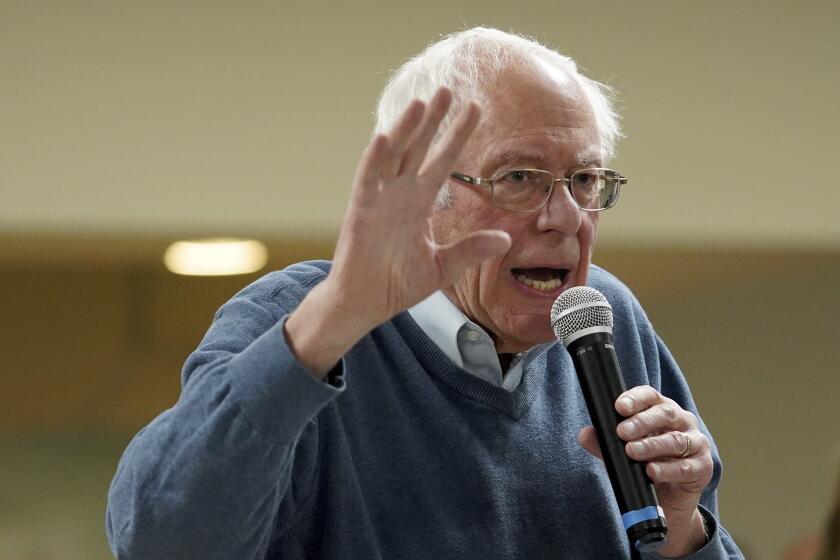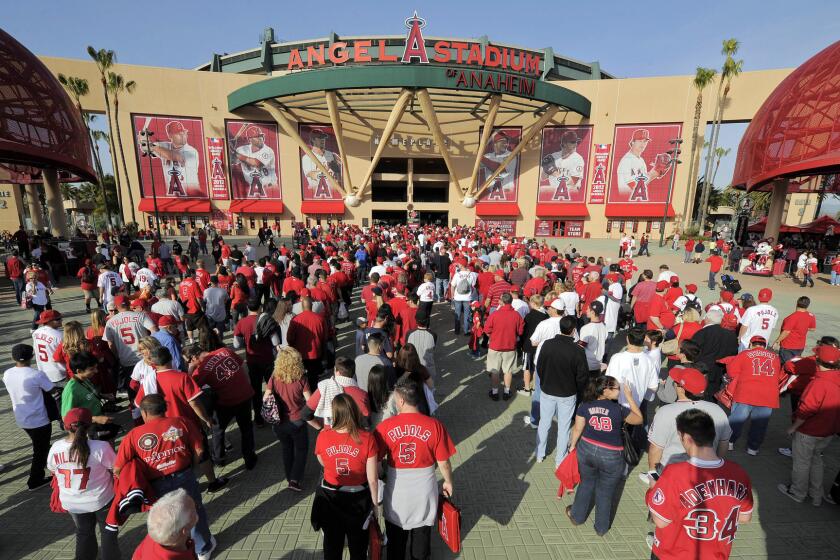MLB winter meetings: More money for top free agents, more players left out in cold

- Share via
Brian Cashman, the general manager of the New York Yankees, has made it something of a holiday tradition to rappel down a tall building. On Friday, he was about halfway down the side of a 22-story building in Connecticut when he noticed a sign on a window.
“Please sign Gerrit Cole,” the sign read.
Cashman is trying his best. He has dusted off the Yankees playbook, and he is running the same play that worked to lure CC Sabathia 11 years ago: If the stud pitcher lives in California and might prefer to play in his home state, go visit him in California, remind him the Yankees are in the business of winning championships, and offer to pay him a premium to play on the East Coast.
Cole is widely expected to sign the richest contract of any pitcher in major league history, with the over-under at $250 million. Stephen Strasburg would go for less — at 31, he is two years older — but not much less. He walked away from a guaranteed $100 million, opting out of the final four years of his Nationals deal so he could sign for more, in Washington or elsewhere.
The Dodgers and Angels met with both pitchers in recent days. Neither Cole nor Strasburg should linger on the market into spring training, as Bryce Harper and Manny Machado did last spring. Suitors for Harper and Machado were few and questions about each player many; for Cole and Strasburg, suitors are many and questions are few.
Democratic presidential candidate Sen. Bernie Sanders talks to the L.A. Times about his crusade to stop baseball from eliminating 42 minor league teams.
However, with the winter meetings starting Monday in San Diego, the most intriguing pitcher among this class of free agents might be Zack Wheeler, whom the Philadelphia Phillies signed this week to a five-year, $118-million deal. His exceptional riches embody the sport’s embrace of analytics.
Madison Bumgarner remains unsigned. He is 10 months older than Wheeler. He has accomplished much that Wheeler has not: a World Series championship (three of them); an All-Star appearance (four); a full-season earned-run average of 3.00 or better (five); a 200-inning season (seven).
Bumgarner posted a 3.90 ERA last season. Wheeler, in his contract year last season, posted a 3.96 ERA. But his fastball is hearty, and the Phillies clearly are betting that back-to-back 180-plus-inning seasons have proven enough durability to overcome injuries early in his career.
Bumgarner has pitched more than twice as many innings as Wheeler. Ten years ago, teams would be drooling to sign a World Series hero, with a decorated resume and a still-effective arm. Today, with teams increasingly less interested in paying for past performance than in analytic projections, Wheeler is the trendy bet.
The guiding hand of analytics revealed itself again Monday, when teams cut 54 arbitration-eligible players, bloating the size of the free-agent class beyond 200 — that is, enough to fill the rosters of eight major league teams. The players that did sign were announced as “avoiding arbitration,” but that language was misleading at best.
The arbitration process does not start until January, when teams and players exchange proposed salaries. In the traditional terminology, “avoiding arbitration” means settling on a salary before an arbitration hearing, not the new meaning of avoiding the arbitration process entirely by cutting a player. Teams have tilted supply and demand so heavily in their favor that, for all but the elite players, the free-agent market can offer a comparable player at a cheaper price.
San Francisco Giants outfielder Kevin Pillar, the winner of the Willie Mac Award as the team’s top player on and off the field? Cut, because he could make too much money in arbitration. Minnesota Twins first baseman C.J. Cron, who hit 25 home runs last year and 30 the previous year? Same. Oakland Athletics reliever Blake Treinen, whose ERA is below 3.00 in his career and was below 1.00 in 2018? Same.
The Miami Marlins picked up useful players this week — infielders Jesus Aguilar and Jonathan Villar — simply because the Marlins would pay them. The Marlins! Villar hit 24 home runs and stole 40 bases for the 108-loss Baltimore Orioles, who decided not to pay him.
It’s a trend worth watching, because baseball’s compensation system is broken. Gone is the promise of playing three years at or slightly above the sport’s minimum wage of about $550,000, then striking it rich in arbitration and free agency.
If analytics say spending big bucks on older players is inefficient, then the players want the owners to spend big bucks on younger players. The owners like the system as it is. And, short of a salary cap that players swear they never would accept and owners do not really need because they have gamed the system already, it is difficult to imagine what the players could give the owners in exchange for a new compensation system. That could lead to a strike in two years.
For now, the owners say, they are spending on the right players. Look at Harper and Machado and Wheeler and, soon, Strasburg. The very best players are getting more money than ever.
The Angels have reached a deal to keep the team in Anaheim through 2050 following the purchase of the stadium and surrounding parking lots for $325 million. So what happens next?
But the Cole saga figures to become the defining story line of the winter, and you can thank Angels owner Arte Moreno for that.
If Moreno had not signed Mike Trout to what basically amounts to a lifetime contract last spring, Trout would be entering his final year with the Angels, and the winter meetings would amount to little more than a Trout Fest: Would Trout even consider a new deal with the Angels, so close to free agency? Should they trade him for prospects? Should they try to win now and worry about a new deal later?
It would have been nonstop ranting on sports talk, on cable and on radio: WHAT ARE THE ANGELS GOING TO DO?????? Signing Trout stopped that conjecture before it started.
If this winter goes as the Angels hope, and they sign Cole, this would be a productive calendar year for Moreno: a cool billion dollars committed to securing Trout, Cole, Angel Stadium and all the parking lots that surround it.
On Friday, hundreds of Amazon Prime delivery trucks were in those parking lots, rented as a staging area for holiday deliveries. None of those trucks were making a next-day delivery of a certain coveted pitcher, so the Angels can only wait, in the hope their Christmas stocking is filled with Cole, not coal.
More to Read
Go beyond the scoreboard
Get the latest on L.A.'s teams in the daily Sports Report newsletter.
You may occasionally receive promotional content from the Los Angeles Times.













